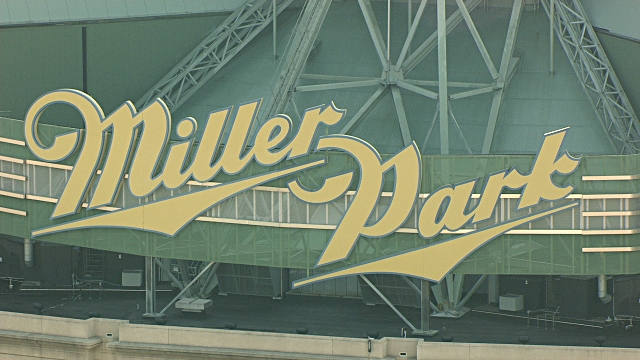Seth VanderLaan, executive chef for Delaware North Sportservice at Miller Park in Milwaukee, was recently profiled by the Milwaukee Journal Sentinel for his efforts to grow many of the vegetables and herbs used in the ballpark’s food items, as well as his strategy for reducing waste at the ballpark. Below are highlights from the article.
 Miller Park patrons are increasingly open to new flavors and food experiences, he said. They might not realize that the fresh pico de gallo on their nachos includes tomatoes and peppers grown in the Chef’s Garden.
Miller Park patrons are increasingly open to new flavors and food experiences, he said. They might not realize that the fresh pico de gallo on their nachos includes tomatoes and peppers grown in the Chef’s Garden.
“It’s all about bringing on the local flavors,” VanderLaan said on a recent morning, surveying the modest-sized garden located behind a screened fence along the walkway near centerfield.
“During that 10-day homestand, we cut down three rows of chives.”
Focus on ‘sustainability’
The garden is a small part of a broader sustainability effort undertaken at Miller Park by VanderLaan and his employer, Delaware North, the company with the stadium concessions contract.

“If this was just a garden for show, I’d put it out in the public,” he said.
VanderLaan ticked off some of the veggies coming this season: corn, acorn squash, kale, Swiss chard, seven varieties of tomatoes.
VanderLaan’s efforts extend beyond what’s cooked up in his kitchens.
He’s working to track and reduce food waste, boost recycling and buy as many products and supplies as possible from local or regional vendors. It’s all part of the reason he was the keynote speaker at the recent Sustainability Summit held at Milwaukee Area Technical College.
Fans and players have taken notice, said Rick Schlesinger, the Brewers chief operating officer.
“We are very supportive of all of these initiatives and are partnering with Delaware North on the overall implementation,” he said.
“We have heard from everyone from fans to families of players; they appreciate healthy food options at Miller Park, and there is also a high interest in sustainability.”
A new biodigester
Last month, the Brewers took the sustainability efforts a step further with the installation of a biodigester, which can transform — on a small scale — food waste into wastewater. It’s a first for a Major League Baseball park, he said.

The digester can handle about 500 pounds a day, or about 15,000 pounds over a year, he said.
An app on VanderLaan’s phone shows the biodigester’s work in real time. In about a month of operation, it’s handled about 4,700 pounds of waste, and saved the equivalent of 63.8 cubic feet of landfill space or 188 gallons of gasoline.
“If it’s not good enough to be donated, it gets discarded,” VanderLaan said of the leftover brats, hot dogs and other items.
The biodigester is “way better for the environment” than simply throwing out the unused food, he said. “Ideally, we’ll be getting to the point where I can put bins in all of my kitchens.”





RECENT COMMENTS